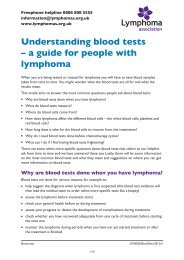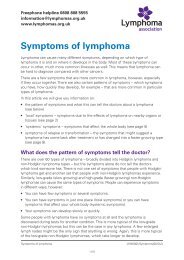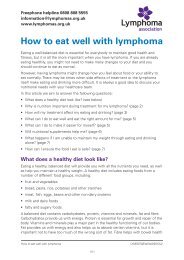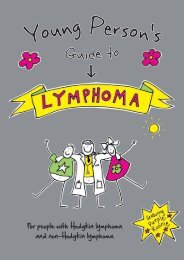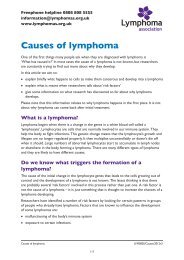Steroids â a guide for people with lymphoma - Lymphoma Association
Steroids â a guide for people with lymphoma - Lymphoma Association
Steroids â a guide for people with lymphoma - Lymphoma Association
Create successful ePaper yourself
Turn your PDF publications into a flip-book with our unique Google optimized e-Paper software.
Freephone helpline 0808 808 5555<br />
in<strong>for</strong>mation@<strong>lymphoma</strong>s.org.uk<br />
www.<strong>lymphoma</strong>s.org.uk<br />
<strong>Steroids</strong> – a <strong>guide</strong> <strong>for</strong> <strong>people</strong><br />
<strong>with</strong> <strong>lymphoma</strong><br />
Steroid drugs are commonly used as part of the treatment <strong>for</strong> <strong>lymphoma</strong>. They are<br />
used in the treatment of both Hodgkin <strong>lymphoma</strong> and non-Hodgkin <strong>lymphoma</strong>. In this<br />
in<strong>for</strong>mation sheet we aim to answer the questions you might have about steroids:<br />
• What are steroids? (see below)<br />
• How are steroid drugs given? (page 2)<br />
• Why are steroids given as part of <strong>lymphoma</strong> treatment? (page 2)<br />
• When are steroids given as part of <strong>lymphoma</strong> treatment? (page 3)<br />
• What side effects can steroids cause? (page 3)<br />
• Are there any precautions I should take if I am taking steroids? (page 6)<br />
<strong>Steroids</strong> are often given together <strong>with</strong> chemotherapy. We have separate<br />
in<strong>for</strong>mation on chemotherapy and on other <strong>lymphoma</strong> treatments. Please<br />
contact the helpline on 0808 808 5555 if you would like this in<strong>for</strong>mation or if you<br />
would like to talk to someone about any aspect of your treatment. You can also<br />
download the in<strong>for</strong>mation from our website (www.<strong>lymphoma</strong>s.org.uk).<br />
What are steroids?<br />
Natural steroids<br />
<strong>Steroids</strong> are hormones that are produced naturally in the body. Hormones are chemical<br />
messengers that control the way our bodies work. The body produces two main types<br />
of steroid hormone – sex hormones and corticosteroids. The sex hormones you might<br />
have heard of are oestrogen, progesterone and testosterone. They are produced in the<br />
ovary and the testis and they are involved in our sexual development and in fertility.<br />
These are not the type of steroid used to treat <strong>lymphoma</strong> and other cancers.<br />
The steroids used to treat cancer are a <strong>for</strong>m of corticosteroid. Corticosteroids are<br />
made naturally in the body by the adrenal glands, which are small organs that lie just<br />
above each kidney. Corticosteroids play a vital role in our metabolism and they help to<br />
control many of the body's functions. They help to:<br />
• control the way the food we digest is processed and the way it provides the energy<br />
we need<br />
• control the balance of salt and water in the body<br />
• regulate the blood pressure<br />
<strong>Steroids</strong> – a <strong>guide</strong> <strong>for</strong> <strong>people</strong> <strong>with</strong> <strong>lymphoma</strong><br />
LYM0034/<strong>Steroids</strong>/2013v3<br />
1/8
• regulate the immune system, our defence against infection<br />
• reduce inflammation and allergic reactions<br />
• regulate our mood and how excitable we feel.<br />
Steroid drugs<br />
The steroids that are used to treat disease are man-made corticosteroids. Steroid drugs<br />
have been used <strong>for</strong> many years to treat a wide range of diseases. <strong>Steroids</strong> can be<br />
used to treat illnesses that are caused by inflammation, such as asthma, inflammatory<br />
bowel disease and some <strong>for</strong>ms of arthritis. They are also used in the treatment<br />
of some cancers. The steroids used most often to treat cancer are prednisolone,<br />
methylprednisolone and dexamethasone.<br />
Note that ‘anabolic’ steroids are manufactured steroid hormones that some athletes<br />
have been known to take in order to increase their muscle strength. These are quite<br />
different from the steroids that are used in cancer treatment.<br />
How are steroid drugs given?<br />
Steroid drugs can be given:<br />
• orally (by mouth), in tablet, soluble tablet or liquid <strong>for</strong>m<br />
• intramuscularly (by injection into a muscle)<br />
• intravenously (into a vein) – either given through a short, thin tube called a 'cannula'<br />
that has been put in one of your veins or through a central line or a PICC line<br />
(a peripherally inserted central catheter)<br />
• topically (as ointments or creams).<br />
Our in<strong>for</strong>mation on chemotherapy gives more detail on central and PICC lines<br />
used to give <strong>lymphoma</strong> treatments. Please ring the helpline on 0808 808 5555<br />
or visit www.<strong>lymphoma</strong>s.org.uk if you would like more in<strong>for</strong>mation.<br />
Why are steroids given as part of <strong>lymphoma</strong> treatment?<br />
<strong>Steroids</strong> are given to treat <strong>lymphoma</strong> because they can:<br />
• help destroy the cancerous <strong>lymphoma</strong> cells – high levels of steroids are very<br />
poisonous to lymphocytes, the blood cells which <strong>for</strong>m a <strong>lymphoma</strong> when they grow<br />
out of control<br />
• make the body more sensitive to chemotherapy<br />
• reduce some of the side effects of chemotherapy, such as nausea (feeling sick) or<br />
allergic reactions to other anti-<strong>lymphoma</strong> drugs<br />
• improve your appetite and increase your energy levels – this effect is sometimes<br />
used in <strong>people</strong> who are particularly unwell because of their <strong>lymphoma</strong>, to improve<br />
their general health be<strong>for</strong>e starting chemotherapy (this is called 'prephase' or 'lead-in'<br />
steroid treatment, see page 3)<br />
• reduce any painful tissue swelling that the <strong>lymphoma</strong> is causing, <strong>for</strong> example from<br />
very swollen lymph nodes (glands) pressing on a nerve.<br />
<strong>Steroids</strong> – a <strong>guide</strong> <strong>for</strong> <strong>people</strong> <strong>with</strong> <strong>lymphoma</strong><br />
LYM0034/<strong>Steroids</strong>/2013v3<br />
2/8
When are steroids given as part of <strong>lymphoma</strong> treatment?<br />
<strong>Steroids</strong> may be given:<br />
• alone to treat a few types of <strong>lymphoma</strong>, such as cutaneous T-cell <strong>lymphoma</strong>, a skin<br />
<strong>lymphoma</strong> that can often be treated successfully <strong>with</strong> steroid creams or ointments<br />
• together <strong>with</strong> chemotherapy to make it more effective and to help reduce<br />
side effects such as nausea. This is the most common way steroids are given in<br />
<strong>lymphoma</strong> treatment. An example of a chemotherapy–steroid treatment regimen<br />
is CHOP, a combination of cyclophosphamide, hydroxydaunorubicin and vincristine<br />
(Oncovin ® ) <strong>with</strong> the steroid drug prednisolone<br />
• to treat side effects of other <strong>lymphoma</strong> treatments – <strong>for</strong> example to treat<br />
allergic reactions to transfusions of blood products or allergic reactions to 'targeted<br />
therapies' such as rituximab<br />
• as prephase treatment <strong>for</strong> a few days be<strong>for</strong>e starting chemotherapy in <strong>people</strong><br />
who are very unwell or frail.<br />
If you are already on steroid treatment <strong>for</strong> another medical condition, your medical<br />
team will take that into account when they plan your treatment. They will review all<br />
your current medication when they assess your general health and will liaise <strong>with</strong> your<br />
other doctors if necessary.<br />
What side effects can steroids cause?<br />
Over the next few pages we will describe the side effects that you might experience.<br />
These effects are really just an exaggeration of the normal functions of corticosteroid<br />
hormones in the body.<br />
Everyone’s reaction to steroids will be different. Whether you develop side effects<br />
will depend on what dose of steroids you are given and on how long you take them<br />
<strong>for</strong>. There are some things you can do to cut down the likelihood of some of the side<br />
effects developing.<br />
Many side effects are short term and will go away once you stop treatment but it is<br />
important that you let your team know about any symptoms you have, so that they<br />
can help you to manage them.<br />
Indigestion or heartburn<br />
<strong>Steroids</strong> can irritate the stomach and cause heartburn, stomach pain or indigestion.<br />
The tablets should be taken after a meal or <strong>with</strong> milk to help protect the stomach<br />
lining. You might be prescribed specially coated steroid tablets or stomach-protecting<br />
medicines.<br />
Don’t take any over-the-counter medicines, such as antacids, <strong>with</strong>out discussing<br />
this <strong>with</strong> your doctor first. This is because some preparations can react <strong>with</strong> steroids<br />
(see page 6).<br />
<strong>Steroids</strong> – a <strong>guide</strong> <strong>for</strong> <strong>people</strong> <strong>with</strong> <strong>lymphoma</strong><br />
LYM0034/<strong>Steroids</strong>/2013v3<br />
3/8
Increased appetite and weight gain<br />
<strong>Steroids</strong> stimulate the appetite, so <strong>people</strong> taking them tend to eat more and put on<br />
weight. Weight tends to go on around the face and trunk and can be lost from the<br />
arms and legs. This change in fat distribution occurs because of the way steroids<br />
control the body’s food stores.<br />
You might find that even if your appetite doesn’t seem greatly increased or you are<br />
off your food because of the chemotherapy drugs, you might still put on weight while<br />
you are taking steroids. Many <strong>people</strong> find this side effect of their treatment quite<br />
distressing, but your weight should go down again when the steroids are stopped.<br />
Fluid retention<br />
Steroid hormones from the adrenal glands play a role in regulating the body's salt and<br />
water balance. Sometimes <strong>people</strong> taking steroid drugs retain too much fluid, causing<br />
swelling of the ankles, hands or feet, or puffiness around the eyes. This can make you<br />
feel bloated, which is unpleasant but rarely very troublesome.<br />
Changes in blood sugar levels<br />
Our natural steroids act to raise the level of glucose (sugar) in the blood, while the<br />
hormone insulin acts to lower it. The balance of these hormones keeps our glucose<br />
level under control. This balance can be disrupted by steroid drugs and the body's<br />
glucose levels can rise. Some <strong>people</strong> who are taking steroids develop high levels of<br />
glucose in the blood and some even develop diabetes. This is usually temporary but it<br />
is important to recognise the symptoms. Symptoms to look out <strong>for</strong> are thirst, passing<br />
lots of water, blurring of your vision and having frequent infections such as thrush. Tell<br />
your medical team if you have any of these symptoms.<br />
If you already have diabetes you will need to keep a special check on your glucose<br />
levels if you are being treated <strong>with</strong> steroids. Your diabetic medication might need to be<br />
adjusted. You should be given special advice on how to manage your diabetes while you<br />
are on steroids. If you have a nurse who helps you manage your diabetes, make sure<br />
you let them know you are taking steroids.<br />
Mood and behaviour changes<br />
<strong>Steroids</strong> can cause changes in mood and behaviour. Some <strong>people</strong> can feel better<br />
in themselves and more upbeat than usual, but this can be felt as an unpleasant<br />
edginess or a sensation of being a bit 'high'. <strong>Steroids</strong> can also make <strong>people</strong> very<br />
short-tempered and irritable. Very rarely, they can cause mental confusion. These<br />
changes in mood are caused by an exaggeration of the normal actions of natural<br />
steroids on how excited and nervous we feel.<br />
Some <strong>people</strong> experience problems once the steroids are reduced or stopped – when<br />
they describe feeling ‘low’ or 'flat'. This is also a side effect of your treatment, so do<br />
let your medical team know if you feel this way. Sometimes it is possible to stop the<br />
steroids more slowly, which can be helpful.<br />
<strong>Steroids</strong> – a <strong>guide</strong> <strong>for</strong> <strong>people</strong> <strong>with</strong> <strong>lymphoma</strong><br />
LYM0034/<strong>Steroids</strong>/2013v3<br />
4/8
Difficulty sleeping<br />
Some <strong>people</strong> complain of an inability to sleep when they are taking steroids. The best<br />
way to avoid this problem if you only need one dose in the day is to take your steroids<br />
in the morning. This is the time of day when the body is expecting higher levels of<br />
these hormones naturally, while steroid levels are naturally lower in the evening.<br />
Increased risk of infection<br />
High doses of steroids reduce the body’s ability to fight infection. In particular, you<br />
can become prone to develop viral infections, such as cold sores and shingles. Fungal<br />
infections such as thrush are also more common if you are on steroids.<br />
Less common side effects of steroids used to treat <strong>lymphoma</strong><br />
When steroids are used to treat <strong>lymphoma</strong>, they are given over a period of several<br />
months and in quite high doses, but they are normally only given <strong>for</strong> a few days at a<br />
time, together <strong>with</strong> cycles of chemotherapy. This is why the side effects described<br />
above are temporary and normally not too severe.<br />
The following side effects are less common because they are usually only seen if<br />
steroids are given to <strong>people</strong> <strong>for</strong> long periods, but tell your medical team or your GP if<br />
you have problems <strong>with</strong>:<br />
• skin changes – high levels of steroids can lead to thinning of the skin, making it<br />
more fragile, <strong>with</strong> a tendency to bruise easily. The skin also becomes greasier, <strong>with</strong> a<br />
tendency to develop spots.<br />
• muscle aches or weakness – <strong>people</strong> sometimes find they have difficulty standing<br />
up from a chair or climbing stairs.<br />
• headaches or dizziness – these might be caused by raised blood pressure. Your<br />
blood pressure should be checked regularly while you are on steroids.<br />
• aching bones or bones that break easily – if corticosteroids are given in high doses<br />
<strong>for</strong> more than a few months, especially if they are given <strong>for</strong> several years, they can<br />
cause thinning of the bones (called 'osteoporosis'). This is extremely uncommon<br />
<strong>with</strong> the chemotherapy–steroid regimens used to treat <strong>lymphoma</strong>. You can be<br />
prescribed medicines that will protect you against osteoporosis.<br />
• blurred or reduced vision – if steroids are taken <strong>for</strong> long periods you can develop<br />
cataracts or glaucoma. Again, these side effects are uncommon, but it is important<br />
that you visit your optometrist if you notice changes in your vision.<br />
These lists of side effects of steroids look quite alarming but it is important to<br />
remember that <strong>people</strong> who are treated <strong>with</strong> steroids as part of treatment <strong>for</strong> cancer<br />
rarely experience any lasting ill-effects of these drugs.<br />
<strong>Steroids</strong> – a <strong>guide</strong> <strong>for</strong> <strong>people</strong> <strong>with</strong> <strong>lymphoma</strong><br />
LYM0034/<strong>Steroids</strong>/2013v3<br />
5/8
Are there any precautions I should take if I am taking<br />
steroids?<br />
Taking other medicines<br />
<strong>Steroids</strong> can react <strong>with</strong> other medicines, including some medicines that you can buy<br />
yourself <strong>with</strong>out a prescription. When drugs react <strong>with</strong> one another their effects in<br />
the body can be changed. There are some drugs used to treat inflammation (such as<br />
ibuprofen), indigestion (such as antacids), high blood pressure, heart problems and<br />
tuberculosis that react <strong>with</strong> steroids. Some blood-thinning drugs, anti-diabetic drugs<br />
and anti-seizure drugs are also affected by steroids.<br />
It is there<strong>for</strong>e important to tell your medical team about any other medicines you are<br />
taking. You should also check <strong>with</strong> them be<strong>for</strong>e taking any over-the-counter medicines,<br />
including herbal medicines.<br />
Carrying a steroid warning card<br />
If steroids are taken <strong>for</strong> a long time, the body adapts to the changed hormone levels<br />
and the tablets should not be stopped suddenly. If they are stopped suddenly,<br />
<strong>with</strong>drawal symptoms can occur, which can be severe, especially if you are already<br />
feeling unwell. This is why <strong>people</strong> who take steroids regularly over a long period need<br />
to have them tapered off slowly and why <strong>people</strong> on steroids are sometimes given a<br />
steroid warning card (see Figure 1). A card is not necessary if the steroids are being<br />
given as a very short course of treatment, <strong>for</strong> example when they are used only as an<br />
anti-sickness measure, but you might be given one if you are having a longer course<br />
of steroid treatment.<br />
Figure 1: A steroid treatment card<br />
If you are given a card you<br />
should carry it <strong>with</strong> you<br />
at all times so that in an<br />
emergency a doctor will<br />
know that you are on steroid<br />
treatment and that you need<br />
to keep taking it. Keep it in<br />
your handbag, purse or wallet<br />
<strong>for</strong> 2 years after your steroid<br />
course has finished to alert<br />
<strong>people</strong> to the fact that you<br />
have had steroid therapy. If<br />
you have any dental work or<br />
an operation during this time,<br />
you must show the card to<br />
the dentist or anaesthetist.<br />
<strong>Steroids</strong> – a <strong>guide</strong> <strong>for</strong> <strong>people</strong> <strong>with</strong> <strong>lymphoma</strong><br />
LYM0034/<strong>Steroids</strong>/2013v3<br />
6/8
Pregnancy and breastfeeding<br />
It is recommended that you use reliable contraception while you are on steroids<br />
because it is not advisable to become pregnant or father a child while taking steroids.<br />
<strong>Steroids</strong> pass into breast milk, so breastfeeding is also not advised.<br />
Vaccinations<br />
Ideally, you should not be immunised <strong>with</strong> live vaccines while you are on steroid<br />
treatment or <strong>for</strong> 6 months afterwards. Live vaccines include the measles, mumps and<br />
rubella vaccines (usually given together in the MMR jab), the shingles vaccine and<br />
vaccines against tuberculosis and yellow fever. You can have other, non-live vaccines,<br />
such as the winter flu jab, but they might not be as effective as usual.<br />
Feeling unwell while you are on steroids and chemotherapy together<br />
<strong>Steroids</strong> have an anti-inflammatory effect. This means that they can lower the<br />
body’s temperature and the normal warning signs you get when you have an<br />
infection – such as a fever – might not be so obvious.<br />
This is especially important to remember if you have reduced numbers of<br />
white blood cells called 'neutrophils' in your bloodstream. This low white<br />
blood cell count is called 'neutropenia' and it is a common side effect of many<br />
chemotherapy drugs. If it is possible that your counts could be low, you must tell<br />
your hospital medical team straightaway if you notice any new symptoms such<br />
as cough, diarrhoea, burning when you pass water, or any soreness, redness or<br />
swelling anywhere.<br />
You should also contact the hospital if you have no specific symptoms but just<br />
feel generally unwell – even if your temperature is not raised – in case you have<br />
an infection. You will probably have been given a telephone number to ring if this<br />
happens. The important thing is not to delay in contacting your hospital team, so<br />
that any infection can be treated quickly.<br />
Conclusion<br />
• <strong>Steroids</strong> are a very important and very effective part of <strong>lymphoma</strong> treatment. They<br />
are given to kill <strong>lymphoma</strong> cells and to help <strong>with</strong> the side effects of chemotherapy<br />
and other <strong>lymphoma</strong> treatments.<br />
• <strong>Steroids</strong> are given in a way that maximises their good effects but minimises their<br />
side effects. This means that although side effects are common in <strong>people</strong> having<br />
steroids to treat <strong>lymphoma</strong>, they are not usually severe, difficult to treat or harmful<br />
in the long term.<br />
• If steroids <strong>for</strong>m a substantial part of your chemotherapy, you should carry a steroid<br />
warning card during treatment and <strong>for</strong> 2 years afterwards so that other doctors,<br />
anaesthetists and dentists know that you have been taking them.<br />
• If you are taking chemotherapy drugs at the same time as steroids, let your hospital<br />
team know straightaway if you feel generally unwell, even if your temperature is<br />
not high, especially if your blood counts could be low.<br />
<strong>Steroids</strong> – a <strong>guide</strong> <strong>for</strong> <strong>people</strong> <strong>with</strong> <strong>lymphoma</strong><br />
LYM0034/<strong>Steroids</strong>/2013v3<br />
7/8
Acknowledgement<br />
The <strong>Lymphoma</strong> <strong>Association</strong> would like to thank Dr Paul Revell, consultant<br />
haematologist at Staf<strong>for</strong>d Hospital, <strong>for</strong> his help <strong>with</strong> revising this in<strong>for</strong>mation sheet.<br />
Further in<strong>for</strong>mation<br />
British Medical <strong>Association</strong> and Royal Pharmaceutical Society of Great Britain. British<br />
National Formulary. 66th edition. September 2013 – March 2014.<br />
Cancer Research UK. <strong>Steroids</strong> (dexamethasone, prednisolone, methyl prednisolone).<br />
CRUK. Available at: www.cancerresearchuk.org/cancer-help/about-cancer/treatment/<br />
cancer-drugs/steroids (accessed 16 November 2013).<br />
Patient.co.uk. Oral steroids. Available at: www.patient.co.uk/health/oral-steroids<br />
(accessed 16 November 2013).<br />
How we can help you<br />
We provide:<br />
● a Freephone helpline providing in<strong>for</strong>mation and emotional support 0808 808 5555<br />
(9am–6pm Mondays–Thursdays; 9am–5pm Fridays) or in<strong>for</strong>mation@<strong>lymphoma</strong>s.org.uk<br />
● in<strong>for</strong>mation sheets and booklets about <strong>lymphoma</strong> (free of charge)<br />
● a website <strong>with</strong> <strong>for</strong>ums – www.<strong>lymphoma</strong>s.org.uk<br />
● the opportunity to be put in touch <strong>with</strong> others affected by <strong>lymphoma</strong> through our<br />
buddy scheme<br />
● a nationwide network of <strong>lymphoma</strong> support groups.<br />
How you can help us<br />
We continually strive to improve our in<strong>for</strong>mation resources <strong>for</strong> <strong>people</strong> affected by <strong>lymphoma</strong><br />
and we would be interested in any feedback you might have on this article. Please visit<br />
www.<strong>lymphoma</strong>s.org.uk/feedback or email publications@<strong>lymphoma</strong>s.org.uk if you have<br />
any comments. Alternatively please phone our helpline on 0808 808 5555.<br />
We make every ef<strong>for</strong>t to ensure that the in<strong>for</strong>mation we provide is accurate but it should<br />
not be relied upon to reflect the current state of medical research, which is constantly<br />
changing. If you are concerned about your health, you should consult your doctor.<br />
The <strong>Lymphoma</strong> <strong>Association</strong> cannot accept liability <strong>for</strong> any loss or damage resulting from<br />
any inaccuracy in this in<strong>for</strong>mation or third party in<strong>for</strong>mation such as in<strong>for</strong>mation on<br />
websites which we link to. Please see our website<br />
(www.<strong>lymphoma</strong>s.org.uk) <strong>for</strong> more in<strong>for</strong>mation about<br />
how we produce our in<strong>for</strong>mation.<br />
© <strong>Lymphoma</strong> <strong>Association</strong><br />
PO Box 386, Aylesbury, Bucks, HP20 2GA<br />
Registered charity no. 1068395<br />
Updated: November 2013<br />
Next planned review: 2016<br />
<strong>Steroids</strong> – a <strong>guide</strong> <strong>for</strong> <strong>people</strong> <strong>with</strong> <strong>lymphoma</strong><br />
LYM0034/<strong>Steroids</strong>/2013v3<br />
8/8




